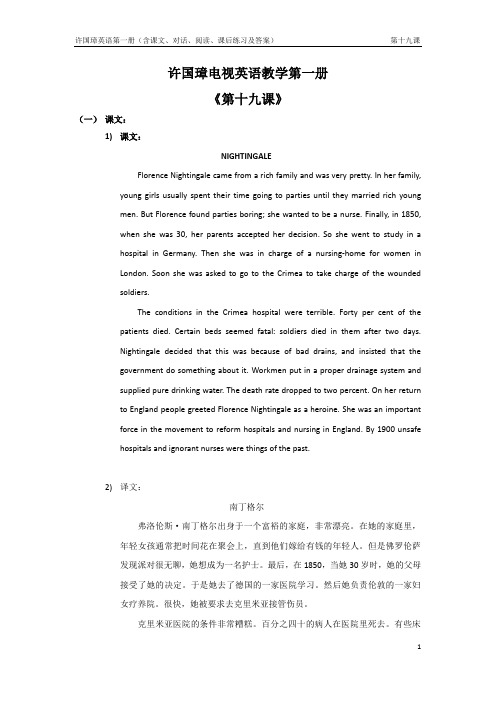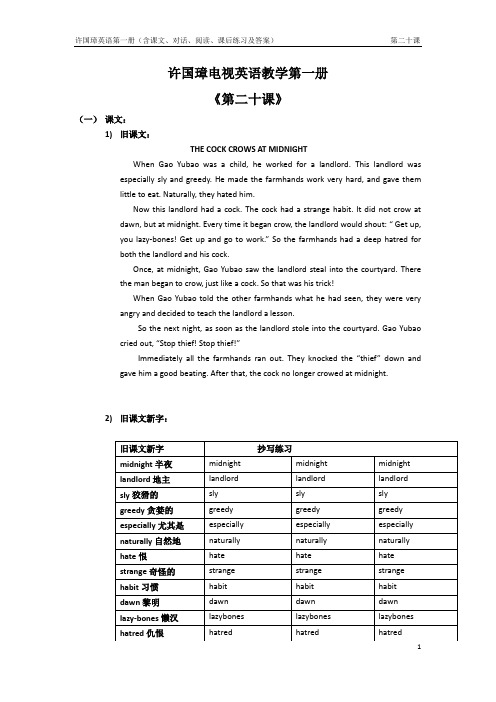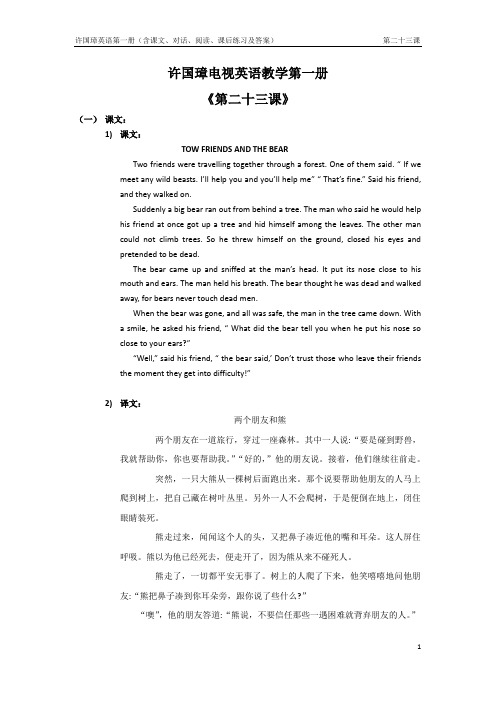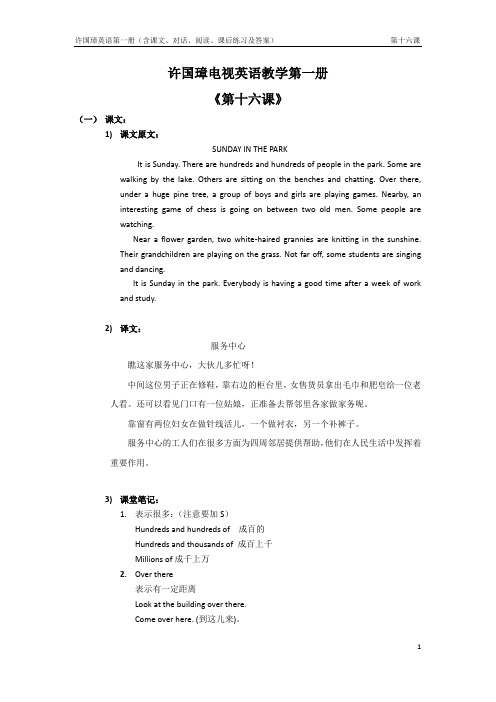许国璋电视英语教学第一册第二十三课课文、练习、答案
许国璋英语第一册第十九课课文、对话、练习、答案

许国璋电视英语教学第一册《第十九课》(一)课文:1)课文:NIGHTINGALEFlorence Nightingale came from a rich family and was very pretty. In her family, young girls usually spent their time going to parties until they married rich youngmen. But Florence found parties boring; she wanted to be a nurse. Finally, in 1850,when she was 30, her parents accepted her decision. So she went to study in ahospital in Germany. Then she was in charge of a nursing-home for women inLondon. Soon she was asked to go to the Crimea to take charge of the woundedsoldiers.The conditions in the Crimea hospital were terrible. Forty per cent of the patients died. Certain beds seemed fatal: soldiers died in them after two days.Nightingale decided that this was because of bad drains, and insisted that thegovernment do something about it. Workmen put in a proper drainage system andsupplied pure drinking water. The death rate dropped to two percent. On her returnto England people greeted Florence Nightingale as a heroine. She was an importantforce in the movement to reform hospitals and nursing in England. By 1900 unsafehospitals and ignorant nurses were things of the past.2)译文:南丁格尔弗洛伦斯·南丁格尔出身于一个富裕的家庭,非常漂亮。
许国璋英语第一册23霍恩伯格督学查看学校

霍恩伯格督学查看学校 Inspector Hornberg visits a schoolInspector Hornberg visits a schoolThe classroom was very quiet . Outside ,the leafless trees were white with the first snowfall . But not one pair of eyes strayed from the history books which twenty-five little girls were studying so earnestly.This was the year 1877,and the school was in Warsaw , Poland . A large part of Poland had been conquered by Russia . The Russian Tsar would not allow Polish children to study the history of their own country or even their own language . But here the teacher and her pupils were doing just that , although the Russians had spies everywhere in Warsaw.Among the children was Manya Sklodovska .She was a very bright pupil . She was deep in the book she was reading . Suddenly there came the faint sound of a bell. Manya listened fearfully . Was it the signal ? Yes ! Two long rings , two short rings.Every head came up . Quick hands grabbed all the Polish history books off the desks , and hid them away . The girls swiftly took sewing materials from their desks . They began to embroider little squares of cloth .The outer door opened .There stood Inspector Hornberg .Hornberg had been put in charge by the Russians of the private schools of Warsaw. He was a heavy man in a tight-fitting yellow and blue uniform . With his was Mademoiselle Sikorska , the head of the school."We have two sewing classes a week , Mr. Inspector ,"explained Mademoiselle Tupalska , the teacher ."I read to the children while they work.""And what have you been reading to your pupils ,Mademoiselle ?"Inspector Hornberg demanded.She held up the book ."Russian fairy tales ,"she said.The inspector gave a grunt of approval ."Now ,"he said ,"I should like to question one of your pupils.""Manya Sklodovska , please stand up," the teacher said quietly.Manya rose from her seat without a word ,trying not to tremble ."Recite the Lord's Prayer----in Russian ,"Inspector Hornberg ordered .Manya recited the prayer in a low voice , careful not to show her feelings ."Now name the members of the Imperial Russian Family."Manya gave the names ."Now tell me , "Hornberg demanded ,"who is our ruler ?"Manya's face went pale .She opened her mouth ,but the words would not come."So , my little Polish patriot , you do not wish to tell me who rules over us ,"the Russian inspector said ,"Answer me!""His Majesty Alexander II , Tsar of All the Russias ,"she said .But her voice was trembling."That's more like it ," Hornberg rose from his chair ."Now Mademoiselle Sikorska , I wish to visit one of the other classes.""Certainly , Mr. Inspector ,"Mademoiselle Sikorska answered.When the door had closed upon them , the schoolgirls began to stir . Without a word , the teacher put her arms around Manya and kissed her . Manya was in tears.霍恩伯格督学查看学校教室里鸦雀无声。
新概念英语第一册自学笔记含课后练习答案:Lesson23-24

新概念英语第一册自学笔记含课后练习答案:Lesson23-24新概念英语第一册第23-24课课文详注 further notes on the text1.动词的双宾语在give me some glasses中,动词give后面有两个宾语,即直接宾语some glasses和间接宾语me。
人称代词作宾语时要用人称代词的宾格。
请参见lessons 21~22语法部分。
2.the ones on the shelf.是架子上的那几只。
本句是省略句,句首省略了i want。
句中的ones代表glasses。
on the shelf是介词短语,作定语,修饰ones。
3.these?这几只?是do you want these?的省略形式。
4.yes, please.是的,请拿给我。
当别人问你要不要某物而你同意要时,就可用这句话。
又如:假如你不同意要,则应说:no, thank you. 不,谢谢。
5.数字1,117,1,420,1,925,2,000的英文写法1,117----one thousand one hundred and seventeen1,420----one thousand four hundred and twenty1,925----one thousand nine hundred and twenty-five2,000----two thousand新概念英语第一册第23-24课语法 grammar in useon引导的介词短语(1)我们经常在名词、名词短语、代词或动名词前面用介词表示人物、事件等与其他人物、事件等之间的各种关系,如空间关系、时间关系、因果关系等。
介词始终带有宾语。
即使介词与宾语分开时,这种关系仍必定存有。
有很多固定的介词短语常可见到。
很多介词短语是由介词+名词(+介词)构成的,如:on time(准时),in the middle of(在……中间)。
许国璋英语第一册第二十二课课文、练习、答案

许国璋电视英语教学第一册《第二十二课》(一)课文:1)新课文:TOURISMModern means of transportation, communication, advertising and credit have all played a part in the growth of a giant new industry, tourism. Tourism is a serviceindustry. It does not sell a product that you can own but provides services on atemporary basis. the customer gets such things as a seat on a plane, a room in ahotel, and a chance to sit on a beach in the sunshine.Until modern times, a trip was often a long and difficult adventure. People had to travel by horse or camel or on foot. The first development in moderntransportation was the steamship. More recently, automobiles and planes havemade travel both faster and more convenient.Advertising has played a large part in the growth of tourism, when hotels and travel agencies began to advertise the attractions of different tourist areas, theairlines and other transportation companies advertised the low fares to reach them.Modern means of communication have enabled the travelers to reserve a plane seator a hotel room from a long distance. And they can travel now and pay later by usingtheir credit cards. All these means have become one of the features of modern life.2)译文:旅游业现代交通、通信、广告以及信用手段对新兴的庞大的行业——旅游业的发展起到了作用。
许国璋电视英语教学第一册第二十课(含旧课文)

许国璋电视英语教学第一册《第二十课》(一)课文:1)旧课文:THE COCK CROWS AT MIDNIGHTWhen Gao Yubao was a child, he worked for a landlord. This landlord was especially sly and greedy. He made the farmhands work very hard, and gave themlittle to eat. Naturally, they hated him.Now this landlord had a cock. The cock had a strange habit. It did not crow at dawn, but at midnight. Every time it began crow, the landlord would shout: “ Get up,you lazy-bones! Get up and go to work.” So the farmhands had a deep hatred forboth the landlord and his cock.Once, at midnight, Gao Yubao saw the landlord steal into the courtyard. There the man began to crow, just like a cock. So that was his trick!When Gao Yubao told the other farmhands what he had seen, they were very angry and decided to teach the landlord a lesson.So the next night, as soon as the landlord stole into the courtyard. Gao Yubao cried out, “Stop thief! Stop thief!”Immediately all the farmhands ran out. They knocked the “thief”down and gave him a good beating. After that, the cock no longer crowed at midnight.2)旧课文新字:3)新课文:LADY GODIVA戈黛娃夫人Godiva was the beautiful wife of the Lord of Coventry. She lived in the eleventh century.According to an old legend, the Lord taxed the people of Coventry heavily and unjustly. If they did not pay those cruel taxes, they were thrown into prison.戈黛娃夫人是考文垂勋爵的美丽妻子。
许国璋英语第一册第十三课课文、对话、练习、答案

许国璋电视英语教学第一册《第十三课》(一)课文:1)课文原文:A DAY AT COLLEGEWang Qing gets up very early. He dresses, washes, and goes out to do exercises in the fresh morning air. Then he has breakfast.For most of the morning he attends lectures or practices his English. After class hereads in the library or reviews his lessons.Lunch is at twelve. After lunch Wang Qing takes a nap. In the afternoon he doeshis homework and reads the newspaper. Then he has an hour for sports. He runsround the track or plays ball games.After supper he often goes for a walk in the college gardens. Sometimes he listensto the English broadcast. He goes to bed at half past ten.2)新单词:3)课文译文:校园一日王清起得很早。
他穿好衣、洗完脸,就走到室外,在清爽的晨风中做早操,然后去吃早饭。
上午的大部分时间他听课或者练习英语,课后他到图书馆看书,或者复习功课。
12点吃午饭,饭后王清休息一会儿。
下午他做作业、看报纸,随后有一小时的体育活动时间,他或者沿跑道跑跑步或者打打球。
晚饭后他常常去学校花园里散步,有时还收听英语广播。
晚上他预习功课,10点半睡觉。
许国璋电视英语教学第一册第二十三课课文、练习、答案

许国璋电视英语教学第一册《第二十三课》(一)课文:1)课文:TOW FRIENDS AND THE BEARTwo friends were travelling together through a forest. One of them said. “ If we meet any wild beasts. I’ll help you and you’ll help me”“ That’s fine.” Said his friend,and they walked on.Suddenly a big bear ran out from behind a tree. The man who said he would help his friend at once got up a tree and hid himself among the leaves. The other mancould not climb trees. So he threw himself on the ground, closed his eyes andpretended to be dead.The bear came up and sniffed at the man’s head. It put its nose close to his mouth and ears. The man held his breath. The bear thought he was dead and walkedaway, for bears never touch dead men.When the bear was gone, and all was safe, the man in the tree came down. Witha smile, he asked his friend, “ What did the bear tell you when he put his nose soclose to your ears?”“Well,” said his friend, “ the bear said,’Don’t trust those who leave their friends the moment they get into difficulty!”2)译文:两个朋友和熊两个朋友在一道旅行,穿过一座森林。
许国璋英语第一册第十六课课文、对话、练习、答案(2)

许国璋电视英语教学第一册《第十六课》(一)课文:1)课文原文:SUNDAY IN THE PARKIt is Sunday. There are hundreds and hundreds of people in the park. Some are walking by the lake. Others are sitting on the benches and chatting. Over there,under a huge pine tree, a group of boys and girls are playing games. Nearby, aninteresting game of chess is going on between two old men. Some people arewatching.Near a flower garden, two white-haired grannies are knitting in the sunshine.Their grandchildren are playing on the grass. Not far off, some students are singingand dancing.It is Sunday in the park. Everybody is having a good time after a week of work and study.2)译文:服务中心瞧这家服务中心,大伙儿多忙呀!中间这位男子正在修鞋,靠右边的柜台里,女售货员拿出毛巾和肥皂给一位老人看。
还可以看见门口有一位姑娘,正准备去帮邻里各家做家务呢。
靠窗有两位妇女在做针线活儿,一个做衬衣,另一个补裤子。
服务中心的工人们在很多方面为四周邻居提供帮助,他们在人民生活中发挥着重要作用。
3)课堂笔记:1.表示很多:(注意要加S)Hundreds and hundreds of 成百的Hundreds and thousands of 成百上千Millions of成千上万2.Over there表示有一定距离Look at the building over there.Come over here. (到这儿来)。
- 1、下载文档前请自行甄别文档内容的完整性,平台不提供额外的编辑、内容补充、找答案等附加服务。
- 2、"仅部分预览"的文档,不可在线预览部分如存在完整性等问题,可反馈申请退款(可完整预览的文档不适用该条件!)。
- 3、如文档侵犯您的权益,请联系客服反馈,我们会尽快为您处理(人工客服工作时间:9:00-18:30)。
许国璋电视英语教学第一册《第二十三课》(一)课文:1)课文:TOW FRIENDS AND THE BEARTwo friends were travelling together through a forest. One of them said. “ If we meet any wild beasts. I’ll help you and you’ll help me”“ That’s fine.” Said his friend,and they walked on.Suddenly a big bear ran out from behind a tree. The man who said he would help his friend at once got up a tree and hid himself among the leaves. The other mancould not climb trees. So he threw himself on the ground, closed his eyes andpretended to be dead.The bear came up and sniffed at the man’s head. It put its nose close to his mouth and ears. The man held his breath. The bear thought he was dead and walkedaway, for bears never touch dead men.When the bear was gone, and all was safe, the man in the tree came down. Witha smile, he asked his friend, “ What did the bear tell you when he put his nose soclose to your ears?”“Well,” said his friend, “ the bear said,’Don’t trust those who leave their friends the moment they get into difficulty!”2)译文:两个朋友和熊两个朋友在一道旅行,穿过一座森林。
其中一人说:“要是碰到野兽,我就帮助你,你也要帮助我。
”“好的,”他的朋友说。
接着,他们继续往前走。
突然,一只大熊从一棵树后面跑出来。
那个说要帮助他朋友的人马上爬到树上,把自己藏在树叶丛里。
另外一人不会爬树,于是便倒在地上,闭住眼睛装死。
熊走过来,闻闻这个人的头,又把鼻子凑近他的嘴和耳朵。
这人屏住呼吸。
熊以为他已经死去,便走开了,因为熊从来不碰死人。
熊走了,一切都平安无事了。
树上的人爬了下来,他笑嘻嘻地问他朋友:“熊把鼻子凑到你耳朵旁,跟你说了些什么?”“噢”,他的朋友答道:“熊说,不要信任那些一遇困难就背弃朋友的人。
”3)课堂笔记:1.Adapted from Aesop’s fables (改编自伊索寓言)He adapted the play from the novel.The play was adapted from the novel.(被动语态)2.I’m from out of town.(form的用法)You may choose from among these discsThe noise came from under the floor.3.They threw themselves at the enemy.(扑向敌人)She threw herself into his arms.(投入怀抱)e up to sb.(走近某人)Come up to sht.(走近某物)5.Go up,(去的方向)Go up to sb.Go up to sht.6.She was close to tears.(接近于)It’s getting close to midnight.7.Out of breath(上气不接下气)He has run for an hour and he is out of breath now.8.Take a breath(喘口气)Let me take a breath.9.Gone的常用表示:All those happy days were gone.(过去了)His hair was nearly all gone.(失去了)All my salary is gone.(用完了)His parents were gone and he became an orphan.(死了的)10.Get into trouble(遇上麻烦)Get into danger(遇上危险)11.momentI’ll call you the moment I get there.The moment she entered the room, she turned on the TV set.12.moral(寓意)a false friend is the worst enemy.A friend in need is a friend indeed.(二)DIALGUE:(对话)1)原文:IN THE DINING-ROOM-What are we going to have for lunch?-Fish, vegetables and egg soup.-Are we going to have rice or steamed bread?-Both, I think. And there’ll be noodles too.-Shall I go and get the dishes?-Yes, please. And I’ll get the bowls, spoons and chopsticks.2)对话译文:在饭厅—我们午餐吃什么?—鱼、蔬菜和鸡蛋汤。
—吃米饭还是吃馒头?—我想都有吧。
而且面条也有。
—我去拿碟子吧?—好的,我去拿碗、勺子和筷子。
3)课堂笔记:1.Dining room 比较小的餐厅或家中餐厅Dining hall 比较大的食堂Canteen 自助食堂2.Fish, soup,rice, bread等为不可数名词,没有复数形式。
A bowl of rice 一碗米饭A piece of bread 一片面包A loaf bread g 一整只面包3.插入语:可放在句首,句中,句未。
To tell you the truth, I don’t like the weather here.It’s time, I think, to have a coffee break.The train is late, I suppose.4.Instant noodles 方便面5.Dish 可以指盘子,也可指一盘菜A cold dishA sweet dishMy favorite dish is sweet and sour spare-rib.6.chopsticks.本身即为复数a pair of chopsticks 一双筷子(三)GRAMMAR:1)一般问句形式:1.Is she a doctor or a nurse?2.Do you eat at home or at the dining hall?3.Will you come to pick me up or shall I go by taxi?2)特殊问句形式:1.Who is going to do that, you or he?2.How shall we go there? By bus or by bike?3.Which do you prefer, red wine or white?3)在一般疑问句后,加or not,或加一个否定形式:1.Are you coming or not?2.Will you buy it or not?(四)EXERCISES:(练习)1)回答问题:(A)1.We have just read an interesting story, haven’t we? What is it about?Yes, we have.It is about two friend met a bear in the forest.2.What were the two friends doing? What did one of them say?They were travelling together through a forest.One of them said.” If we meet any wild beasts. I’ll help you and you’ll help me.”3.What happened?When they walked on , a big bear ran out from behind a tree.4.Were they afraid? What did one of them do? What did other do?Yes ,they were.One of them who said he would help his friend at once got up a tree and hid himself among the leaves.The other man could not climb trees. So he threw himself on the ground, closed his eyes, and pretended to be dead.5.What did the bear do to the man on the ground?The bear came up and sniffed at the man’s head. It put its nose close to his mouth and ears.6.Did the bear hurt the man? Why not?No, it didn’t.Because the man held his breath, when the bear put its nose close to his mouth and ears. The bear thought he was dead, for bears never touch dead men.7.What did the man in the tree do when the bear was gone?He came down with a smile.8.What did he say to the other man? What answer did he get?he asked his friend, “ What did the bear tell you when he put his nose so close to your ears?”His friend said.”The bear said,’Don’t trust those who leave their friends the moment they get into difficulty!”9.How do you like the story? What does it tell you?I like the story.It tell me don’t trust those who leave their friends the moment they get into difficulty!”(B)10.At what times do you have your meals? And where?I usually eat lunch at 12 o’clock in my office.11.What do you usually have for breakfast? And what usually for lunch and supper?I usually have noodles for breakfast, lunch and supper to eat rice.12.Do you often have rice and steamed bread? Do you have noodles some times?No, I don’t have steamed bread,.Yes, I have noodles some times.13.Who prepare your food? They work very hard, don’t they?My parents prepare my food.Yes, they do.2)翻译词组:(a)(B)3)用所给词汇结合适当时态造选择问句,并给回答:1.You, be , first-year student, second-year studentAre you a first-year student or a second-year student?I am a first-year student.2.We, leave, today, tomorrowWill we leave today or tomorrow?When shall we leave, today or tomorrow?We will leave tomorrow.3.You , play, basketball, footballDo you play basketball or football?What do you play, basketball or football?We play basketball.4.You, want, the red pen, the blue oneDo you want the red pen or the blue one?Which do you want, the red pen or the blue one?I want to the red pen.5.Henry, go , to the film, to the concertHas Henry gone to the film or to the concert?Is Henry going to the film or to the concert?Henry gone to the film.6.George, live on the first floor, on the second floorHas George lived on the first floor or on the second floor?Does George live on the first floor or on the second floor?Where does George live , on the first floor or on the second floor?He has lived on the first floor.7.We , copy, the first paragraph, second paragraphShall we copy the first paragraph or the second paragraph?What shall we copy, the first paragraph or the second paragraph?We will copy the first paragraph.8.I, clean the window, sweep the floorShall I clean the window or sweep the floor?What shall I do , clean the window or sweep the floor?You will clean the window.4)先变为一般疑问句,再就划线部分提特殊问句,:1.He has left his notebook in the dormitory.Has he left his notebook in the dormitory?What has he left in the dormitory?Where has he left his notebook?2.She has bought a picture of the Great Hall of the People.Has she bought a picture of the Great Hall of the People.What has she bought in the Great Hall of the People?Where has she bought a picture?3.They have decided to set up two evening schools.Have they decided to set up two evening schools?What have they decided?How many evening schools have they decided to set up ?4.The teacher told the students to speak more English outside class.Did the teacher tell the students to speak more English outside class?Who told the students to speak more English outside class?What did the teacher tell the students?5.They’ll meet at the college gate at seven.Will they meet at the college gate at seven?Where will they meet at seven?When will they meet at the college gate?6.We are going to meet the workers on Saturday evening.Are you going to meet the workers on Saturday evening?What are you going to do on Saturday evening?When are you going to meet the worker?5)仿照例句造句:1.Shall I (we) go on?提示:背诵对话,抄写全篇课文,用英语回答,把这些字写在纸条上。
